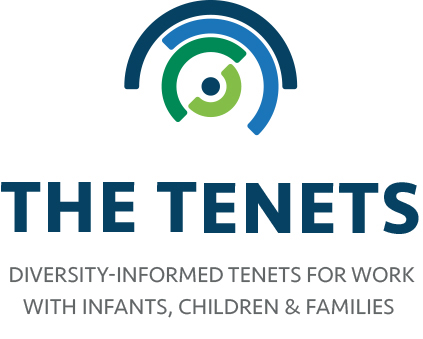Mt. Rainier. ©2025. The UW Visual Media Database is administered and maintained by University Marketing and Communication (UMAC).
Diversity-Informed Tenets for Work with
Infants, Children and Families (Tenets)
The beginning of a conversation…
The Tenets are a set of aspirational principles and framework for strengthening the commitment and capacity of professionals, organizations and systems that serve infants, children and families to realize “a world of beloved community where babies, children, and families thrive.”
Tenets Initiative & Diversity Collective, 2023
Tenet #1: Self-awareness leads to better services for families
Working with infants, children, and families requires all individuals, organizations, and systems of care to reflect on our own culture, values and beliefs, and on the impact that racism, classism, sexism, able-ism, homophobia, xenophobia, and other systems of oppression have had on our lives in order to provide diversity-informed, culturally attuned services.
The Tenets holds central that change is catalyzed when we are grounded in critical self-reflection, act intentionally, responsibly, and accountably to disrupt historical and contemporary patterns of injustice within our social, economic, and political systems, and engage in individual and collective healing and transformation.
Let’s begin.
STANCE TOWARD INFANTS, CHILDREN, AND FAMILIES FOR DIVERSITY-INFORMED PRACTICE
Infants and children are citizens of the world. The global community is responsible for supporting parents/caregivers, families, and local communities in welcoming, protecting, and nurturing them.
Discriminatory policies and practices that harm adults harm the infants and children in their care. Privilege constitutes injustice. Diversity-informed practitioners acknowledge privilege where we hold it, and use it strategically and responsibly. We combat racism, classism, sexism, able-ism, homophobia, xenophobia, and other systems of oppression within ourselves, our practices, and our fields.
Diversity-informed practice recognizes nondominant ways of knowing, bodies of knowledge, sources of strength, and routes to healing within all families and communities.
Families decide who is included and how they are structured; no particular family constellation or organization is inherently optimal compared to any other. Diversity-informed practice recognizes and strives to counter the historical bias toward idealizing (and conversely blaming) biological mothers while overlooking the critical child-rearing contributions of other parents and caregivers including second mothers, fathers, kin and felt family, adoptive parents, foster parents, and early care and educational providers.
PRINCIPLES FOR DIVERSITY-INFORMED RESOURCE ALLOCATION
Diversity-informed practice recognizes the power of language to divide or connect, denigrate or celebrate, hurt or heal. We strive to use language (including body language, imagery, and other modes of nonverbal communication) in ways that most inclusively support all children and their families, caregivers, and communities.
Families are best supported in facilitating infants’ and children’s development and mental health when services are available in their native languages.
Diversity and inclusion must be proactively considered when doing any work with or on behalf of infants, children, and families. Resource allocation includes time, money, additional/alternative practices, and other supports and accommodations, otherwise systems of oppression may be inadvertently reproduced. Individuals, organizations, and systems of care need ongoing opportunities for reflection in order to identify implicit bias, remove barriers, and work to dismantle the root causes of disparity and inequity.
Infant, child, and family-serving workforces are most dynamic and effective when historically and currently marginalized individuals and groups have equitable access to a wide range of roles, disciplines, and modes of practice and influence.
ADVOCACY TOWARDS DIVERSITY, INCLUSION, AND EQUITY IN INSTITUTIONS
Diversity-informed practitioners consider the impact of policy and legislation on all people and advance a just and equitable policy agenda for and with families.
Contact Us:
Barnard Center for Infant and Early Childhood Mental Health
1959 NE Pacific Street | Health Sciences Building, F-356 | Seattle, WA 98195
Fax: 206-685-3284 – ATTN: ACT Program
Contact us by e-mail:
BCact@uw.edu
to join our mailing list, ask questions, or set up 1 to 1 meeting.
 |

